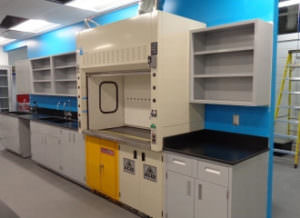Laboratory countertops are important specialized workspace elements. Counters hold equipment, documents and tools. The counter space catches spills, must resists scratching, heat or cold. There are many different materials, finishes and composites for countertops which affect cost and use. Labs’ needs vary widely, this is why before buying your lab countertops it is important to define the requirements and potential uses it will have. This is done to establish the required strengths to choose which will enable us to select the right material or composite. The following are the most popular countertop materials and composites used today.
Phenolic Resin Countertops
Phenolic Resin countertops are durable, hard, lightweight and have a high level of chemical resistance. They are oil and moisture resistant and do not support the growth of most bacteria and fungus which makes them ideal for chemical and biological lab applications. Phenolic resin is an excellent choice for laboratory environments with continuous heat exposure up to 350°F (176°C) – when there is need for continuous exposure to heat beyond this limit, it is better to use Epoxy Resin. Phenolic resin holds up well against impact and stress cracking and is resistant to scuffs and abrasions.

Epoxy Resin Countertops
Epoxy resin countertops are made from a mixture of materials then cured as a solid, continuous product. This type of countertops are durable and economical which makes them a good choice for many types of labs. It is often used around sinks because it is non-porous, water and moisture resistant, and handles well in wet situations. It has a high level of resistance to heat and chemicals, resists blistering, discoloration and cracking in most conditions. Another advantage is that it is durable on its own and does not require the addition of layers or coatings. Epoxy resin countertops are used in many types of labs like educational labs, medical labs, hospitals, R&D labs, pharma labs, biological science labs, industrial testing, etc..
The difference between phenolic resin and epoxy resin is the manufacturing process and its construction materials. Phenolic and epoxy countertops have very similar functionality. Their main difference is their capacity to handle heat. Phenolic resin countertops work well with continuous heat exposure of up to 350°F (176°C) while epoxy resin countertops will handle higher heat loads, including open flame.
Stainless Steel Countertops
Stainless steel countertops and work surfaces provide excellent chemical and heat resistance and are the preferred choice for sterile environments. Stainless steel holds up well to high temperatures but can become discolored over time and usage. The cost is the biggest drawback to stainless steel countertops. Stainless steel is a good choice for microbiology biomedical, biological science labs, pharmaceutical, medical applications, and hospital labs.
There are many more options for countertop materials like wood, corian, concrete, marble or stone. Each choice has its own strengths, weaknesses and costs. When specifying countertops for your laboratory workspace consider these evaluation criteria:
- Electrical conductivity
- Resistance to certain chemicals
- Liquid containment
- Resistance to moisture, liquid, and absorption
- Impact and abrasion resistance
- ADA compliance
- Resistance to heat or open flame
- Load bearing capabilities
- Maintenance
- Availability
- Color options
A lab design professional will help you make the right choice for your laboratory. Countertops are part of lab furniture and fume hoods provided by lab builders.